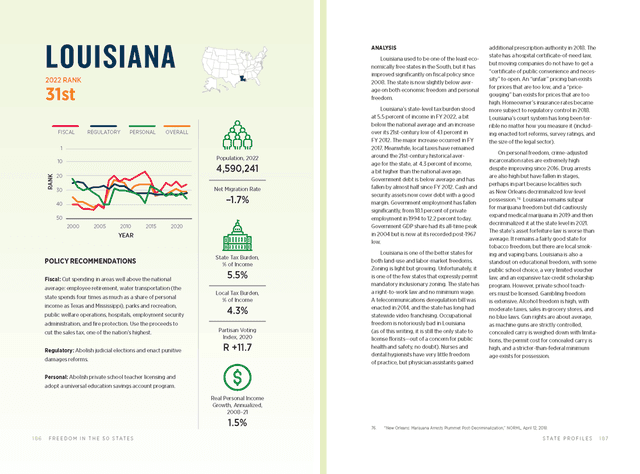Policy Recommendations
- Fiscal Cut spending in areas well above the national average: employee retirement, water transportation (the state spends four times as much as a share of personal income as Texas and Mississippi), parks and recreation, public welfare operations, hospitals, employment security administration, and fire protection. Use the proceeds to cut the sales tax, one of the nation’s highest.
- Regulatory Abolish judicial elections and enact punitive damages reforms.
- Personal Abolish private school teacher licensing and adopt a universal education savings account program.
Analysis
Louisiana used to be one of the least economically free states in the South, but it has improved significantly on fiscal policy since 2008. The state is now slightly below average on both economic freedom and personal freedom.
Louisiana’s state-level tax burden stood at 5.5 percent of income in FY 2022, a bit below the national average and an increase over its 21st-century low of 4.1 percent in FY 2012. The major increase occurred in FY 2017. Meanwhile, local taxes have remained around the 21st-century historical average for the state, at 4.3 percent of income, a bit higher than the national average. Government debt is below average and has fallen by almost half since FY 2012. Cash and security assets now cover debt with a good margin. Government employment has fallen significantly, from 18.1 percent of private employment in 1994 to 12.2 percent today. Government GDP share had its all-time peak in 2004 but is now at its recorded post-1967 low.
Louisiana is one of the better states for both land-use and labor-market freedoms. Zoning is light but growing. Unfortunately, it is one of the few states that expressly permit mandatory inclusionary zoning. The state has a right-to-work law and no minimum wage. A telecommunications deregulation bill was enacted in 2014, and the state has long had statewide video franchising. Occupational freedom is notoriously bad in Louisiana (as of this writing, it is still the only state to license florists—out of a concern for public health and safety, no doubt). Nurses and dental hygienists have very little freedom of practice, but physician assistants gained additional prescription authority in 2018. The state has a medical certificate-of-need law, but moving companies do not have to get a “certificate of public convenience and necessity” to open. An “unfair” pricing ban exists for prices that are too low, and a “price-gouging” ban exists for prices that are too high. Homeowner’s insurance rates became more subject to regulatory control in 2018. Louisiana’s court system has long been terrible no matter how you measure it (including enacted tort reforms, survey ratings, and the size of the legal sector).
On personal freedom, crime-adjusted incarceration rates are extremely high despite improving since 2016. Drug arrests are also high but have fallen in stages, perhaps in part because localities such as New Orleans decriminalized low-level possession. Louisiana remains subpar for marijuana freedom but did cautiously expand medical marijuana in 2019 and then decriminalized it at the state level in 2021. The state’s asset forfeiture law is worse than average. It remains a fairly good state for tobacco freedom, but there are local smoking and vaping bans. Louisiana is also a standout on educational freedom, with some public school choice, a very limited voucher law, and an expansive tax-credit scholarship program. However, private school teachers must be licensed. Gambling freedom is extensive. Alcohol freedom is high, with moderate taxes, sales in grocery stores, and no blue laws. Gun rights are about average, as machine guns are strictly controlled, concealed carry is weighed down with limitations, the permit cost for concealed carry is high, and a stricter-than-federal minimum age exists for possession.

